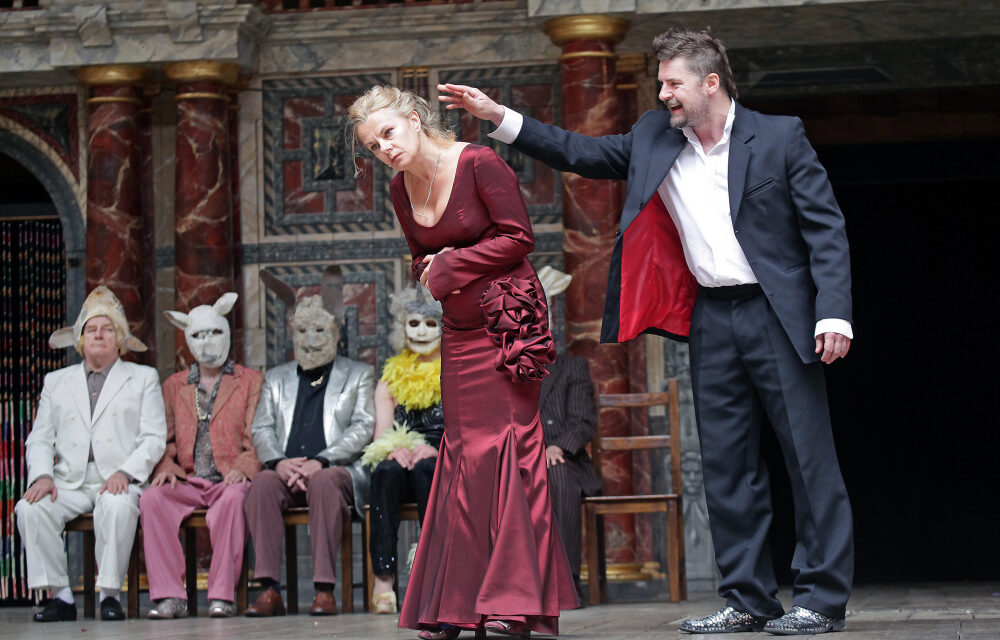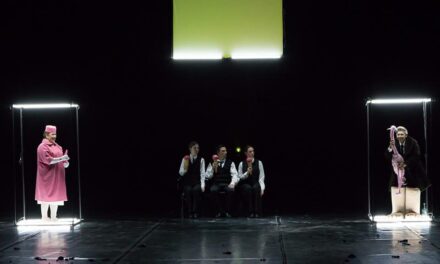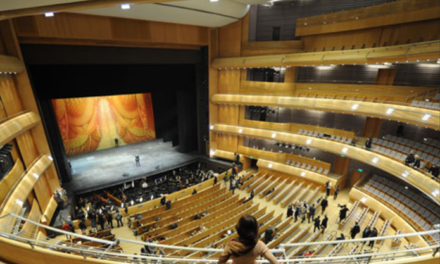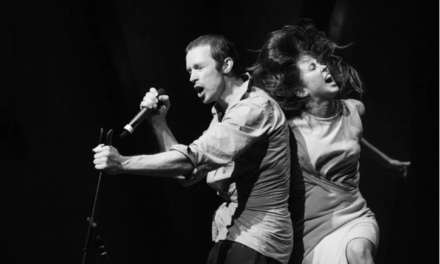L. P. Hartley’s much-recycled observation that ‘the past is a foreign country’ seems an oddly befitting introduction to Opole-based Kochanowski Theatre’s 2004 production of Shakespeare’s Macbeth. In numerous regions, theatre is in a state of limbo, with live performance being an eerie memory of a different world. This world can now be glimpsed at through recordings and archives resurging online. Shakespeare’s Globe provides one such window, offering – amongst their features – a collection of international performances showcased during the 2012 Globe to Globe Festival. The digital explosion of content related to the bard is becoming a phenomenon that is sure to generate further discussions.
Being a first-generation migrant living in the UK, I take it as an opportunity to reconnect with stages that ignited my thespian interests. Also, to review my perspective on Shakespeare. For the past decade, it has been shaped predominantly by glossy offerings of London and Stratford-upon-Avon. It’s a risky approach to this particular Macbeth (or, indeed, Makbet). Director Maja Kleczewska declared at the time that she takes scripts as raw materials and points of departure for explorations of specific themes. She’s not interested in scholarly approaches and production of museum-piece theatre. As a result, her work is often met with polarised responses among the critical circles in Poland and confronted with accusations of textual barbarism as well as disloyalty to her source material.
The period between 2004 and 2011 in Poland saw at least twenty other productions of Shakespeare’s Scottish Play, among them by Grzegorz Jarzyna and Andrzej Wajda – already internationally renowned auteurs. Both these productions, focusing on the theatre of war, tied the drama with the conflict in Iraq and still appeared topical in 2012 while bolstering some of the grandest names among Polish thesps. Jarzyna’s production also featured the same summer in Edinburgh. Yet it’s Kleczewska’s understated production, which focused on the domestic dimension of the tragedy that came to London as part of the Globe’s celebration of the World Shakespeare Festival.
The plot is known well enough and mostly preserved. The staging opens with Macbeth (Michał Majnicz) and Banquo (Przemysław Kozłowski) reclining in armchairs. At the same time, a surtitled introduction outlines how the two men recoup their strengths, following successful war efforts. Liberties with the playtext quickly become apparent through bold editorial choices dropping famous lines or even whole scenes. This Macbeth is no bloodied man, but – much like his comrade – a bandaged up and tracksuited slob. Judyta Paradzińska’s Lady Macbeth is consumed by depression and appears on stage wrapped in a blanket. She perches on his chair’s armrest seeking intimacy but gets no interest from her husband. He seems to be more preoccupied with his mobile phone and treats her as a nuisance.
Here, the Weird Sisters (Andrzej Jakubczyk, Maciej Namysło, Ewa Wyszomirska) come to Macbeth’s household, in cheap plastic bags bearing gifts and hard liquor. Banquo’s remark ‘you should be women, / And yet your beards forbid me to interpret / That you are so’ is taken to the extreme. Designer Katarzyna Borkowska sees them dressed as harlots and drag queens. Their prophecies progress from assured pronouncements to guess-work and wish-fulfillment fantasies. Their fluid identities contrast starkly with the rigidly masculine characters of reposing soldiers. This interplay is further amplified; Macbeth is gifted a copy of Leonard Zagórski’s novel Facet (pl. Bloke). The tribute points to a now largely forgotten but once celebrated author of late 1980’s pulps. This gift is telling in many ways. Foremostly it hints at masculinity being a subject of interrogation. It’s also an intertextual allusion to a protagonist, who – as a product of a system (in Zagórki’s case: totalitarian Poland) – becomes ruthless through his growing consumerist appetite.
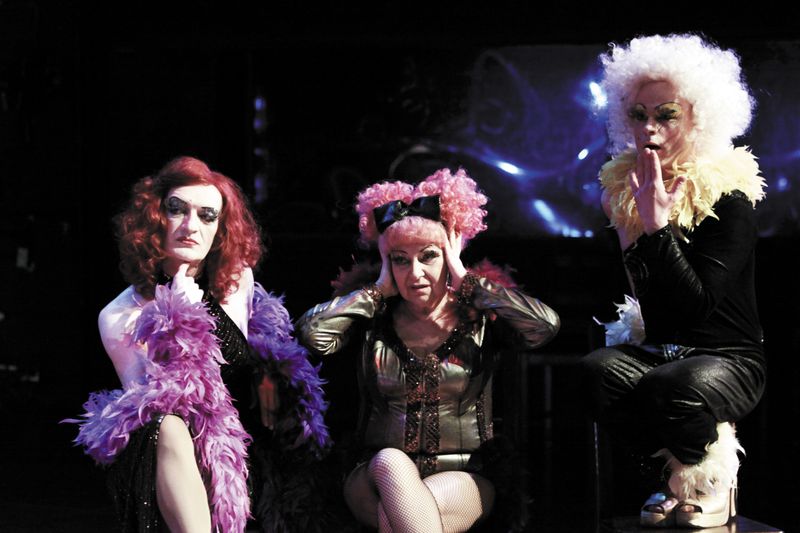
The Weird Sisters: Andrzej Jakubczyk, Ewa Wyszomirska, Maciej Namysło. Photo by Magdalena Sztandara.
Much like Zagórski’s characters, the inhabitants of the kingdom presented on stage come across as relics of a bygone era, struggling to adapt to a post-transformation reality. The scene of King Duncan’s (Grzegorz Minkiewicz) arrival with his courtiers with bold strokes paints a landscape of the realm he rules. His dominion is one of the suburban mobs, with himself as capo di tutti capi among small-town gangsters. His entrance immediately posits him as a lecherous abuser as he assaults one of the witches, who remain on stage throughout most of this production. The Sisters themselves are oddly liminal figures, who switch between boundaries of the fictional world and provide a cabaret-like framing and lip-sync extravaganzas which complement the unraveling plot.
Cabaret aesthetics are quite prevalent in Polish adaptations of Shakespeare (to name Małgorzata Bogajewska’s 2008 Hamlet at the Horzyca Theatre in Toruń or Paweł Miśkiewicz’s 2018 The Temptest at Warsaw’s National Theatre as just a couple). Kleczewska seems to deploy them not as a sensual provocation, but as a counterpoint to escalating violence (as signaled by the inclusion of Liza Minelli’s Mein Herr) and an instance of directorial tricksterism. At the Globe, with an almost bare stage as a backdrop and no lightning design, these musical interludes come across as ostensibly and deliberately amateurish, with their clunky choreography and catchpenny garments. This world is far removed from refined performance and sophisticated tableaus; it’s one of the fools stumbling in cheap and cringey discos.
The choice of music in these scenes – ranging from Jennifer Lopez’s Let’s Get Loud and Michael Jackson’s Billy Jean, through Nancy Sinatra’s Bang Bang (always liked with episodes showing murder) to Gloria Gaynor’s I Will Survive – builds a narrative of recycled clichés. As familiar reference points, they require no engagement and, in consequence, act as a perception filter. Such techniques may suggest these are characters whose experience is mediated through popular culture, which serves as their primary reference point. This notion is mirrored in the composition of individual scenes. They often end abruptly, as if cutting away to the next segment in a manner resembling film editing, again hinting at a prism through which reality is observed. Kleczewska’s later production of A Midsummer Night’s Dream (Modrzejewska National Stary Theatre in Krakow, 2006) made extensive use of film and video. This Macbeth relies on bodily presence alone to deliver its critique.
Bodies – specifically male bodies – are always on display. Either clothed in tacky apparel and gaudy gold chains or semi-nude, they remain uncomfortable to watch. When Duncan arrives at the Macbeths’ household, he holds a prisoner whose only face and groin area are covered. After bestowing titles on Macbeth and declaring Malcolm (Dominik Bąk) as his successor, the soon to be murdered king calls for a celebration, which quickly turns into a rave. The doomed ruler performs a striptease. His aged and obese body, through simulation of a sensual dance directed at the lady of the house, is stigmatized as grotesque. It leaves Lady Macbeth with an expression of disgust. Like most men in this mise-en-scène, his physique bears no resemblance to commonly beheld ideals of beauty.
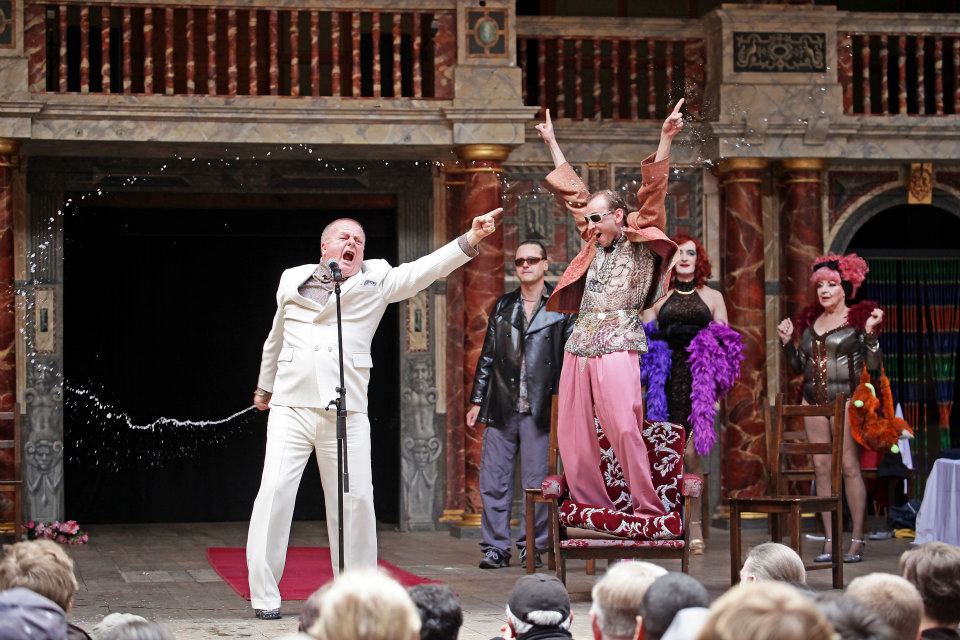
Grzegorz Minkiewicz and Dominik Bąk in Macbeth dir. by Maja Kleczewska. Photo by John Haynes.
Within a patriarchal and homosocial framework, male bodies need not be objects of desire. They achieve carnal pleasure through exercising power. Young Malcolm’s baggy suit may imply he’s yet to have grown into his full form. Taking after others, he adapts an abusive attitude towards women (as illustrated by his strangling of one of the Sisters for amusement). In the eyes of his milieu, he appears a worthy inheritor, one that will preserve the inequitable legacy of his elders. Analogically Macbeth, effete and impotent before his coronation, as monarch finds sexual prowess. After seeing the ghost of Banquo, he reasserts his bravery and virility (‘I dare: / Approach thou like the rugged Russian bear, / The arm’d rhinoceros, or the Hyrcan tiger; / Take any shape but that, and my firm nerves / Shall never tremble’). Lady Macbeth, now with child, watches as her husband attempts to prove this by forcing a Sister to fellate him. The same witch declared her love for Banquo in the opening scene. The scene constitutes a masculine display of conquest.
Thus, regicide becomes a rite of passage towards sexual maturity, positioning violence as an intrinsically unfeminine domain. It’s an assertation somewhat complicated by the portrayal of Lady Macbeth. Paradzińska’s heroine entices Macbeth to slay Duncan and seize the throne. Yet, she later claims it would have been impossible for her to take his life herself due to the king’s resemblance to her father. When her husband fails to slay the guards, it is she who eliminates possible witnesses. It appears only men allow gender to delineate the boundaries of their actions, or have their status define them. Paradzińska renders a character who’s transgressions are not motivated by mere ambition. She shows a protagonist filled with frustration and resentment, desperately seeking agency — her Lady Macbeth rebels against an order that relegates her towards margins.
The heroine takes no pleasure in violence; she does what needs doing. Conversely, her accomplice revels in bestiality and covetously licks blood off his lady’s hands. During the coronation scene (the crown being a pair of sequinned loafers), the carmine canvas of his black suit hints at newfound vampirism. In a reddish-brown dress and a neck wrapped in pearls, his wife becomes Countess Báthory to his Lord Ruthven. Still, her tired leaning on side-pillars and repeated clutching of her pregnant belly intimate she is growing weary of slaughter and seeks domestic bliss. Yet Macbeth, as ruler, internalizes the fearful clinging to power of his predecessors and upholds their oppressive ways of governance, again side-lining his spouse. The actress’s towering performance places the ascending queen as a focal point of the tragedy, with all other elements of the narrative gravitating towards her. This dynamic results in an almost Jamesian portrait of a lady in blood.
The production has Lady Macbeth commit suicide after losing the child; violence breeds violence, not happy endings. The words ‘I have almost forgot the taste of fears’ become the last to be uttered by Macbeth in this rendition, clipping the famous soliloquy. The mise-en-scène jumps to the cruel king being buried under a pile of bodies wearing ‘Birnam Forest’ t-shirts as if the remainder of the play was broadcasted in fast-forward. The closing pageant sees Gaynor’s I Will Survive interrupted mid-refrain as though someone hit the off button on a remote. The hit song, typically an anthem of empowerment and liberation, resounds more like a smokescreen concealing the rise of a new tyrant than a celebration of a villain’s demise. Kleczewska’s Makbet does not see life as a player strutting and fretting upon the stage, instead of appearing to echo Guy Debord’s views on life being entombed in a pyramid of representations. In a mediatized society of the spectacle, these images cease to reference anything but themselves, indeed signifying nothing.
Experiencing this performance might not be pleasant, nor is it meant to be. Maja Kleczewska assembled a manifestly unpoetic universe, devoid of sophistication and permeated by vulgarity. But by building it layer upon layer from scraps of what’s local and particular (the small-town criminal underworld of post-transformation Poland) and what’s appropriated (western popular culture), Kochanowski Theatre’s Makbet can be strikingly relevant when viewed after 16 years of its inception. Showing a network of thugs and despots scrambling for power, it compellingly resonates with the contemporary political scene of Central and East-Central Europe. Power, obtained, legitimized, and sustained through abuse, operating behind a shroud of sequins and glitter, cannot overcome its fascistic context. It can only be derailed by acts of resistance, i.e., ones expressed through art. Kleczewska’s proposition, in transforming a renaissance classic, encourages critical engagement with the past and the present – insisting that if Shakespeare is still our contemporary, it’s because we make him so.
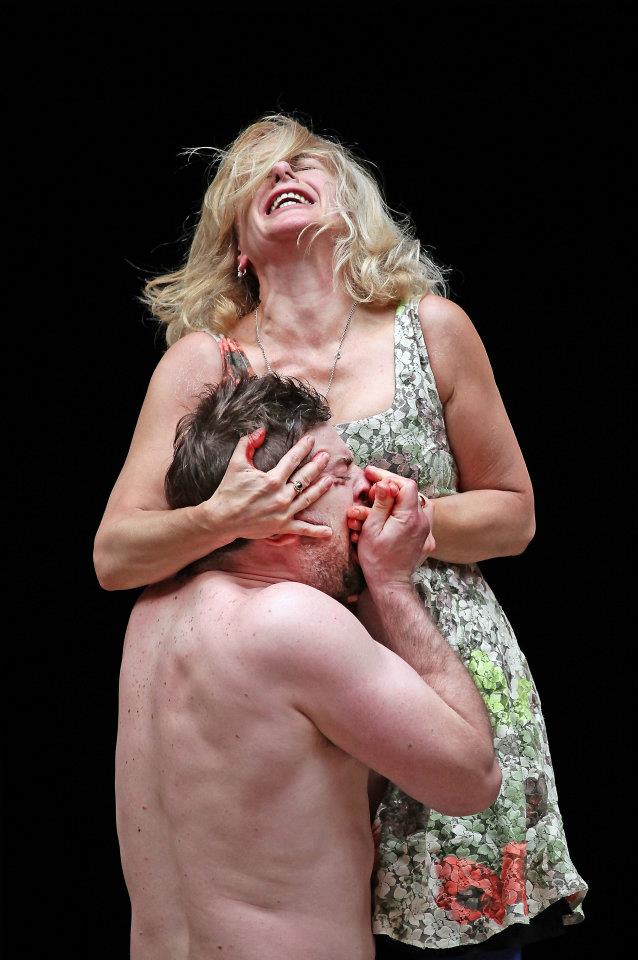
Left: Michał Majnicz and Judyta Paradzińska in Macbeth dir. by Maja Kleczewska. Photo by John Haynes.
Macbeth
Written by William Shakespeare
Translated into Polish by Antoni Libera
Directed by Maja Kleczewska
Performed by The Jan Kochanowski Theatre Company (Opole, Poland) at Shakespeare’s Globe (London, United Kingdom) as part of the 2012 Globe to Globe Festival
Stage and Costume Design by Katarzyna Borkowska
Directed for the Screen by Ian Russell
Available to view at globeplayer.tv
This post was written by the author in their personal capacity.The opinions expressed in this article are the author’s own and do not reflect the view of The Theatre Times, their staff or collaborators.
This post was written by Konrad Zielinski.
The views expressed here belong to the author and do not necessarily reflect our views and opinions.

